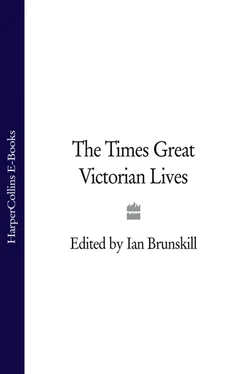Those miserable failures at Strasburg and Boulogne darkened the prospects of Bonapartism apparently for ever. They deprived the Pretender of all initiative in revolutionary movements. Henceforth the Prince would have to watch the tide. The quarry might be his yet, but only when others had struck it down for him. Those very failures, however, were instrumental in revealing no less than in forming his character. Placed in the power of his enemies, after Strasburg, from the 30th of October to the 21st of November, 1836, and, after Boulogne, from the 4th of August, 1840, to the 25th of May, 1846, he gave proof of fortitude and dignity. In his intercourse with his captors, judges, and gaolers, he managed to have himself treated as a Monarch, though a vanquished one. He repaid Swiss hospitality by a spontaneous departure from Arenenberg in August, 1838, when the gallant Confederacy professed its readiness to run the risk of a quarrel with France for his sake. Neither his six years’ confinement in a State fortress – his ‘course of studies at the University of Ham,’ as he termed it, nor the two distinct periods of his not ungenial exile in London – 1838 to 1840, and 1846 to 1848, were lost upon him. Amid the gloom of a captive’s life, as among the dissipations of a small if not quite select society, the activity of his mind was uncommon. He studied England; he conceived for this country that quiet but steady attachment which seldom fails to spring up in the heart of those who spend a summer and winter among us. Among the French the Prince generally sought tools and accomplices; of the English he made friends and companions. He was stanch rather than choice in his connexions. The consciousness of the loftiness of his ends rendered him indifferent to the lowness of his means. The best instrument in the schemer’s hand was the most passive, hence, if necessary, the most unscrupulous. His knowledge of men seldom failed him, and commensurate with his knowledge was his indulgence to their foibles, and his sympathy with their moods. He accepted devotion with all its burdens and drawbacks. He was a friend à toute épreuve. A partisan might have to be disavowed, but no one was ever sacrificed; nor was the least act of kindness shown to the Pretender in adversity ever forgotten by the Sovereign in his prosperity.
Eighteen hundred and forty-eight came. The faintheartedness of a King and the infatuation of a Minister left France to her own mastery. Ahandful of dreamers and schemers pulled down the whole social edifice. From February to June of that year the disorganization, though less violent and bloody, was far more thorough than during the worst period of the Reign of Terror. In an evil day France had been taken by surprise. On the morrow she was appalled at the results of her own supineness and improvidence. On the third day she was anxious for reaction, on the look-out for a man who could save society. That task was morally fulfilled by Lamartine with a happy phrase; materially by Cavaignac with an awful massacre. By biding his time Louis Napoleon reaped the benefit both of the poet’s and of the soldier’s work. In February he made a tender of his services; but in April and in June he still declined the seats which were offered to him in the National Assembly. On the memorable 10th of April, as the world remembers, Prince Louis Napoleon was still doing duty as special constable in King-street, St. James’s. He ‘wished to undeceive those who charged him with ambition,’ but he ‘would know how to fulfil any duty which the people might lay upon him.’ He said this on the 15th of June; ten days later the revolution was crushed. On the 26th of September he crossed the Channel and made his first appearance in the Assembly. Clear as the ground was before him, actively as his friends exerted themselves in his behalf, he still felt his way cautiously, almost timidly. Republicanism was in the mouth of all; monarchic restoration in the hearts of most men. Lamartine, Cavaignac, any of the so-called Republicans du lendemain, would keep the seat warm for a Prince either of the elder or of the younger Bourbonbranch; but Louis Napoleon, if he took it, would be sure to keep it for himself. Hence there was, doubtless, considerable mistrust of and illwill towards him. Aware of this feeling, and with but little confidence in his debating powers, the Pretender limited himself to a defensive policy in the Assembly. His rare attempts to speak were neither brilliant nor successful. He sat down unmoved, in sullen, silent discomfiture, trusting to the prestige of his uncle’s name to plead his cause among the people. Whether dictated by choice or necessity, his course was the wisest. On the 10th of December, 1848, Cavaignac had a million and a half of the people’s votes for the Presidency of the Republic. Prince Napoleon had above six millions. Upon that vote the supreme power of the Pretender could have been legally and peacefully founded for ever. Up to the close of the year 1848 no good whatever was known about the newly-elected President. Ridicule is apt to kill the most honourable names in France, and the Prince’s name was only associated with the farces of Strasburg and Boulogne. The vast majority of the national representation, the whole wealth and worth of the country, were dead against him; yet the mass of the people had, with very little solicitation and hardly any exertion on his part, pronounced for him. Henceforth the President had possession – nine-tenths of the law – on his side.
For the best part of the next two years the President and the still hostile Assembly were busy with the task of killing the dead. Republicanism had no friends, and no quarter was to be given to it. All efforts were turned to the reestablishment of that compact, centralized administration which, in normal times, constitutes the strength and pride of France. The sword of the State was being tempered; no matter who might be destined to wield it, every one was interested in the keenness of its edge and the sharpness of its point. In the meanwhile, however, its hilt was in the President’s hand and every repressive measure tightened his grasp upon it. Louis Napoleon was sure that the ‘union of the two powers – legislative and executive – was indispensable to the tranquillity of the country.’ The Assembly perceived, too late, that the President was bringing his theory into practice. They strove to limit his powers, to circumscribe his influence; they attempted to curtail his expenditure; they set up a permanent committee; they proposed to take from him the command-in-chief of the Army, and to invest it with the President of the Assembly. Goaded into action by imminent danger, the so-called ‘old parties’ – Bourbonists and Orleanists – were accused of a design to hasten a Restoration, which, if not absolutely impossible, was, at least, premature. In their visits to Claremont after Louis Philippe’s death, and to Wiesbaden at the time of the Count de Chambord’s stay in that place, the friends of the exiled Princes were supposed to be negotiating a fusion between the two branches of the Bourbon family – a negotiation which remains unfinished to the present time. Changarnier, the General in command of the Army of Paris and of the National Guard of the Seine, was pointed out as the French Monk who was to enable the legitimate dynasty to come by its own again. There may have been much or little in these surmises, but Louis Napoleon knew how to make the most of them. The President fought his battles with indifferent success in the Chamber, but his very defeats paved the way for his victories in the country. Nothing could be more daring than his self-assertion; nothing more open than his plans of operation. The Bonapartist conspiracy embodied in the Société du Dix Decembre was carried on with the cards on the table. ‘In extreme dangers,’ said the President, ‘Providence not unfrequently trusts one man with the safety of all.’ At the reviews of St. Maur and Satory the soldiers hailed the President with that cry of ‘Vivel’Empereur!’ to which the garrisons of Strasburg and Boulogne had refused to respond years before.
Читать дальше












